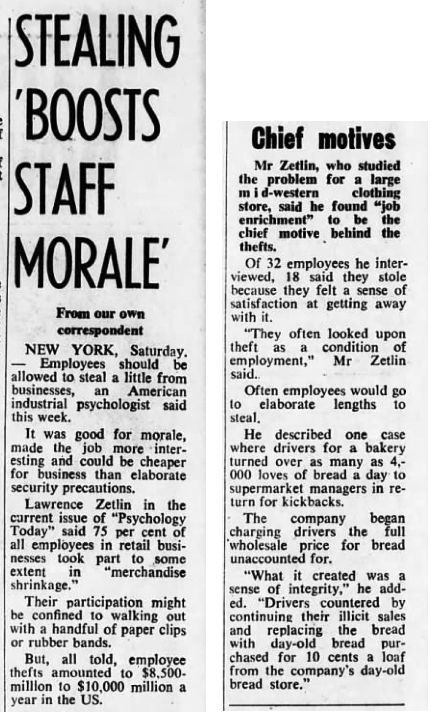Stealing Boosts Staff Morale
Companies do all kinds of things to boost staff morale. They hire motivational speakers, have team-building exercises, give employees gifts, etc.
But the industrial psychologist Lawrence Zeitlin, in an article published in June 1971 in Psychology Today ("A little larceny can do a lot for employee morale"), argued that the most effective way a business could boost morale was by allowing its employees to steal a little from the company.
He argued that theft added to a sense of "job enrichment" by making the job more interesting. It gave employees a sense of satisfaction at getting away with it. Also, workers "often looked upon theft as a condition of employment." Furthermore, he noted, allowing the theft could be cheaper than installing elaborate security precautions.
In her book Management and Ideology, business author Judith Merkle provides some background info on Zeitlin's article:

But the industrial psychologist Lawrence Zeitlin, in an article published in June 1971 in Psychology Today ("A little larceny can do a lot for employee morale"), argued that the most effective way a business could boost morale was by allowing its employees to steal a little from the company.
He argued that theft added to a sense of "job enrichment" by making the job more interesting. It gave employees a sense of satisfaction at getting away with it. Also, workers "often looked upon theft as a condition of employment." Furthermore, he noted, allowing the theft could be cheaper than installing elaborate security precautions.
In her book Management and Ideology, business author Judith Merkle provides some background info on Zeitlin's article:
Before its publication in Psychology Today the Harvard Business Review had previously turned down the article. It was, after all, a classic application of amoral Scientific Management techniques, and it offended the HBR down to its puritan roots. The interesting point is, however, that the control practices recommended in this article bear a close family resemblance to the working practices of Stalinism. Allowing theft, while keeping the rules against theft, certainly makes theft more thrilling, but it also opens up the way to arbitrary and discriminatory uses of power through the selective application of dead-letter rules. This is, of course, the first step in the destruction of the rule of law, and, in the long run, leads to the introduction of de facto totalitarianism.

Sydney Morning Herald - May 30, 1971
Comments
The 70's was about the start of the idea that employee loyalty & motivation could be molded and/or bought instead of earned.
Posted by Expat47 in Athens, Greece on 05/25/16 at 10:58 AM
I worked at a big box store back in the '90s and we weren't allowed to steal, per se, but we were allowed to do things like apply our employee discount on already heavily discounted clearance merchandise. For example, I picked up a $600 area rug for $25. One employee did a special order for a large number of custom windows. Oddly, the customer failed to pick up his order. That is because the customer never existed. The custom sized windows couldn't be sold in open stock, or returned to the manufacturer so were sold to another employee at about 1/10 the original price. Amazingly enough, every window fit his house PERFECTLY! Almost like someone had gone out and measured the windows prior to ordering! What a MIRACLE! (rolls eyes)
This wasn't SUPPOSED to occur, but I think they turned a blind eye to it for the reasons in the article above.
This wasn't SUPPOSED to occur, but I think they turned a blind eye to it for the reasons in the article above.
Posted by puptentacle on 05/25/16 at 02:15 PM
I swear all those pens and sticky notes are MINE !!!
Posted by BrokeDad in Midwest US on 05/25/16 at 06:15 PM
Wow BrokeDad, I never knew your last name was "Corp."!
Posted by Captain DaFt on 05/25/16 at 07:56 PM
Johnny Cash had something to say on this subject in 1976, about working on the Cadillac assembly line:
I got it one piece at a time
And it didn't cost me a dime
You'll know it's me when I come through your town
I'm gonna ride around in style
I'm gonna drive everybody wild
'Cause I'll have the only one there is around.
I got it one piece at a time
And it didn't cost me a dime
You'll know it's me when I come through your town
I'm gonna ride around in style
I'm gonna drive everybody wild
'Cause I'll have the only one there is around.
Posted by KDP on 05/25/16 at 09:30 PM
I was shocked when my uncle was fired from the highway department for stealing, but when I went to his house to talk to him, all the signs were there.
Posted by Phideaux on 05/25/16 at 10:06 PM
Commenting is not available in this channel entry.

Category: Business | Crime | 1970s